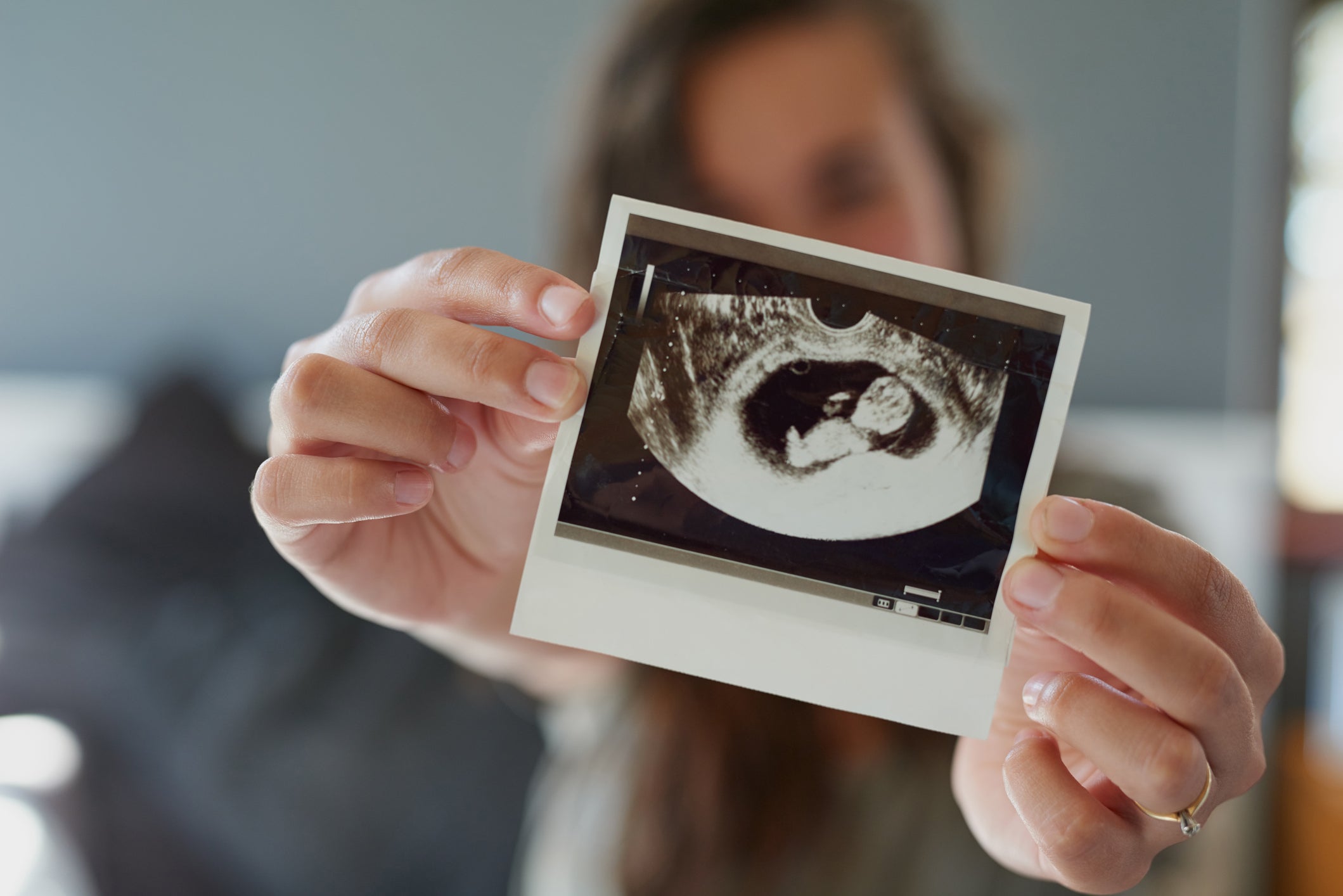The Independent's journalism is supported by our readers. When you purchase through links on our site, we may earn commission.
Liking for two: Navigating the complicated politics of sharing pregnancy on social media
As Emily Ratajkowski makes headlines for her high-profile pregnancy announcement and Chrissy Teigen elicits criticism for posting about baby loss, Olivia Petter asks whether there’s ever a right way to post about your pregnancy online


In the space of one week, three of Fiona’s friends announced that they were pregnant on Instagram. Normally, this would be cause to celebrate. But Fiona, 32, from Leeds, is having trouble conceiving. “I’m really happy for them all, but it’s so hard seeing daily updates about other people’s pregnancies on my feed when I’m desperately trying – and so far failing – to conceive with my husband. I’ve started muting accounts.”
When something good happens to you, it’s only natural to want to tell people about it. Today, the most economical way to do that is with a social media post. And so regardless of whether it’s an engagement, a new job, or the discovery of a new brunch spot, our private celebrations have become public ones. This is all very well and good, except perhaps when it comes to pregnancy.
The NHS estimates that around one in seven couples in the UK may have difficulty conceiving. There are many causes, with common ones including lack of regular ovulation, blocked fallopian tubes, and endometriosis, which is when tissue that behaves like the lining of the womb is found outside of it. This is just one of the many reasons why an Instagram feed full of pregnancy announcements might be upsetting to women who are struggling to get pregnant.
“It’s so hard seeing people go through that journey when you feel like you can’t,” Fiona adds. “Yes, my friends are quite rightly celebrating that they’re going to be parents – and I get that – but it felt like they hadn’t considered anyone else’s feelings about seeing their happy news plastered all over social media.”
For Catherine, 39, seeing pregnancy announcements on social media only served as a painful reminder of her own infertility. “I have gone through seven cycles of IVF and miscarried at every round,” she says. “During this period, I was regularly faced with pregnancy announcements online from friends, family members and celebrities, and each time it was a kick in the stomach – the stomach that I needed so desperately to be home to a baby.” Like Fiona, Catherine grappled with feelings of anger and guilt. “Their lives were beginning, yet I felt like I was dying inside. I wanted to be happy for them, but how could I when my heart was breaking time and time again? I deleted all social media.”
There’s another reason why seeing other women share their pregnancy online might be difficult. Aimee, 20, from Northlanarkshire, has had five miscarriages in the last two years. “It's so hard to see pregnancy announcements on social media, because when you see others post about how amazing it is that they have this beautiful bundle of joy, you can’t help but feel so let down by your own body,” she says. “You feel extremely guilty, too, for having some kind of anger towards these people even though you are very happy for them."
Miscarriage is the most common type of pregnancy complication, with one in four women experiencing at least one during their reproductive lifetime. As social media has become more woven into the fabric of our lives, so has sharing your pregnancy journey online. But seeing this kind of post can be deeply distressing to women who have miscarried.
You feel extremely guilty, too, for having some kind of anger towards these people even though you are very happy for them
It’s a subject that has been in the news a lot recently, with major celebrities including Gigi Hadid, Nicki Minaj, and Paloma Faith, all announcing their pregnancies to much fanfare on Instagram with countless posts, videos, and occasionally, photoshoots. Then, just when you thought pregnancy announcements couldn’t get more high-profile, along comes model Emily Ratajkowski, who this week debuted her baby bump on the cover of American Vogue, which was accompanied by a short film directed by Lena Dunham and an essay about her decision to raise a gender-neutral child.
“I think until you’ve experienced a miscarriage or baby loss, you can be quite naïve to the situation,” says Eliza, 34, in London, who miscarried when she was 12 weeks pregnant. “It’s not unless you’ve personally experienced that you will truly understand why every pregnancy post on Instagram feels like a shattering reminder of what you lost.”
Research conducted by miscarriage and stillbirth charity Tommy’s has found that 77 per cent of women who had lost babies felt angry towards their pregnant friends, while 80 per cent felt jealous. “Social media can really fuel these difficult emotions,” says Tommy’s midwife Amina Hatia. “Going online can be a great way for bereaved families to connect and support one another, but it can also make the loss harder to bear if your newsfeed is full of people sharing a journey you wish you were still on.”
The difficulty with posting about one’s pregnancy is that such posts, like with most things we see on social media, are likely to be filtered through a veil of inauthenticity. In short, we only post the good bits. “This can create the illusion that the pregnancy is perfect, but there is a big difference between the edited highlights we see on social and real-life experiences,” says Michelle Kennedy, CEO and founder of the Peanut app, which connects women through all stages of motherhood and filters any content that might be triggering for women who have miscarried, such as photos of ultrasounds. “It was really important that we put certain safeguards in place to spare women the experience of seeing pregnancy announcements,” she adds. “Women are more likely to post about their pregnancies than they are to discuss difficulties such as infertility and baby loss.”
But even when a woman does post about such issues, it’s no less contentious. Earlier this month, Chrissy Teigen posted on Instagram about the stillbirth of her baby, Jack. The former model had posted several times about her pregnancy beforehand, making the loss all the more shocking and upsetting to her followers. The photos showed Teigen crying in hospital, being tended to by medical staff and lying alongside her husband John Legend. We are shocked and in the kind of deep pain you only hear about, the kind of pain we’ve never felt before,” she wrote in the caption, explaining that she suffered from excessive bleeding during her pregnancy. “We were never able to stop the bleeding and give our baby the fluids he needed, despite bags and bags of blood transfusions. It just wasn't enough."
Teigen’s post prompted global media coverage, with many of her celebrity friends, like Kim Kardashian West, offering messages of support. However, it also prompted criticism, with some people labelling the former model’s post “insensitive” to women who have suffered baby loss and questioning whether anything can stay private in a social media age.
Teigen has since responded to the comments and defended her decision to post about the loss. "I lived it, I chose to do it, and more than anything, these photos aren’t for anyone but the people who have lived this or are curious enough to wonder what something like this is like,” she wrote in an essay for Medium. “These photos are only for the people who need them. The thoughts of others do not matter to me.”
Despite the criticisms, Teigen’s post was undoubtedly more helpful than it was harmful, with Tommy’s praising the model for speaking openly about her grief and helping to raise awareness of the devastating impacts of baby loss. The critical comments, the charity said in a statement, “exposed the ongoing stigma surrounding baby loss and the idea that families' grief is something which should be keep hidden and secret, tucked away from sight”. Former first lady Hillary Clinton thanked Teigen, too, for “starting a hard conversation to help other families heal alongside [hers]”.
All this raises several important questions: Can you ever share the news of your pregnancy online in a sensitive way? And if you do, how can you do it without glamourising it? And what if you yourself have suffered a miscarriage? These are questions that fashion influencer and writer Monica de la Villardiare found herself asking in a recent essay for British Vogue. De la Villardiare explains her own reluctance to share news of her pregnancy online. “There’s the internal debate as to what should remain private and what should be for public consumption. But, for me, there’s another concern. I had a miscarriage back in May. What if it happens again?” she writes before going on to explain that it wasn’t just the fear of miscarrying again that had prevented her from posting. “It was also a sense of guilt about only sharing the good when I hadn’t shared the bad. It felt unfair to any reader or follower – like a half truth.”
What De la Villardiare’s experience highlights is the sense of responsibility not to use Instagram as a highlights reel, particularly if you have as many followers as she does (116,000). But policing women’s social media accounts is not the solution here. Even if De la Villardiare had posted about her previous pregnancy, that wouldn’t mean she is then obliged to post about her miscarriage, and pressurising women to share the things they aren’t ready to only creates more problems. Similarly, just because Teigen posted about her pregnancy, that doesn’t mean she had to also post about her stillbirth. But she did, and it will have undoubtedly helped a lot of women.
De le Villardiare might not have decided not to post about her pregnancy, but many other women have and will continue to do so. And they should be entitled to celebrate their joy and share it with others however they see fit. Naomi, 34, posted about both of her pregnancies on social media. “I just wanted to share my news with my friends and family in one hit, without having to message them all separately,” she says. Naomi was cautious, though, to wait until she had surpassed her first trimester, after 12 weeks of pregnancy. “I just wanted to be extra cautious,” she adds. Additionally, Corinne, 39, shared a photograph of her first child on Facebook. “We were very excited and it was fun to share that with everyone,” she says.
I think people just need to be mindful to check that their post won’t affect or hurt someone close to them
There are other motivations to sharing your pregnancy online beyond sheer joy. Take Charlotte, 37, who was unwell during her first and second trimesters with hyperemesis gravidarum (HG). Symptoms include prolonged and severe nausea and vomiting. But unlike regular pregnancy sickness, HG may not get clear up completely until after the baby is born. “I didn’t share anything about my pregnancy until quite late into it, but after a few months I decided to share everything in the hope of raising awareness and shining a light on the poor treatment that women with HG endure,” she says. Posting on social media – and later making a documentary – about HG helped Charlotte find closure, she adds.
In this social media age, it would be unrealistic to think that people are going to stop sharing their good news online. And that pregnancies, just as other milestones, like Father’s Day and partner’s birthdays, could unintentionally serve only to remind people of the things they’ve lost. Ultimately, like with all of the aforementioned celebrations, if you’re going to post about your pregnancy, it’s about doing so with sensitivity in mind.
“I think people just need to be mindful to check that their post won’t affect or hurt someone close to them,” says Eliza. “People’s feelings are more important than sharing this news on a platform.” Similarly, Hatia urges women to take caution before posting about their pregnancy online, particularly if you know someone that has experienced baby loss or infertility. “If someone doesn’t send a congratulations message, don’t be offended; they may be struggling to balance their happiness for you with their own grief,” she adds. Kennedy suggests sending friends who might feel triggered a text first, or better yet, simply telling them in-person. “This gives them a chance to process the news in their own time.” It might also encourage engaging conversations about the difficulties they’ve had and hopefully address some of the stigma that surrounds such conversations.
Join our commenting forum
Join thought-provoking conversations, follow other Independent readers and see their replies
Comments

Bookmark popover
Removed from bookmarks